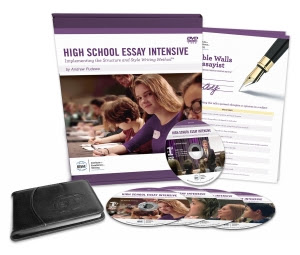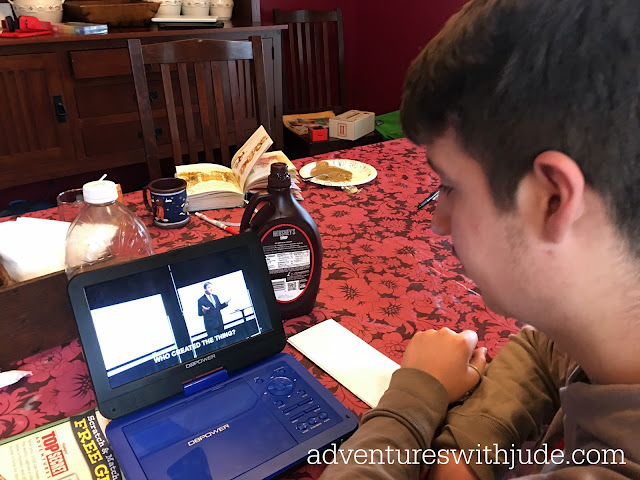The program is a kit with a 5-DVD set (6.5 hours of instruction, plus "paused" time writing), a student handout, and Portable Walls for the Essayist. The program is designed to prepare the student for the time-pressed SAT/ACT essay, as well as college essays. It lightly touches on longer essays and how they are only expanded versions of the basic essay, but the program isn't designed to teach "How to write a term paper." The program is recorded during a single-day writing intensive course. I think something like this is great, for the writer who really needs just a little help and clarity to go from being an "adequate" writer to a "very good" writer. For a kid like Matthew, the DVD version that can be broken up over multiple days and applied across many areas, this program is phenomenal. It gives the same intense instruction, but not at an overwhelming pace.
I have struggled for years to help Matthew with writing. In middle school, he would have to write a paragraph every week, and I'm not sure which of us thought it was more torture. Writing does not come naturally to him. Truthfully, I don't think it comes artificially, either. He gets caught up in "how many sentences" and "how many words." He has become fixated on the rigidity of the topic/three-supporting/closing format. He has wanted to have his own blog series like his brother did, and I've been tap-dancing around the situation. A frank "Dude, you can't string together a paragraph, let alone an essay without serious editorial help," doesn't seem like it would be productive. In theory, the more you write, the better you get, but for Matthew, it just makes him more frustrated. He's looking toward a post-high school trade certification trajectory just so he doesn't have to sit through class after class of paper-writing for a regular degree. It's a valid career path, and not everyone is cut out for college, but it's hard to swallow "I know I won't be able to handle it," without internalizing it as "I'm stupid." It's been rough.
Knowing this information, you can probably tell that he wasn't overjoyed to start on this review. To even get him started, it was a bit of a "lay down the law" situation. He enjoys our annual field trips, and I explained to him that part of being able to do them was not having to spend money during the year on curriculum. We do the reviews so that I don't have to spend money, and everyone who wants to go takes a turn on a review. That's the rule, that's the deal, so if you want to go, park your butt in front of the DVD player and let's go. Resigning himself to his fate, Matthew popped the first DVD in and flopped down.
Oh. My. Goodness. "WHY didn't somebody tell me this before??" became the common response to many topics. If Matthew said it once, he said it fifty times. The first was when Mr. Pudewa was discussing his "TRIAC" model of paragraph writing, and said, "Instead of calling it a conclusion sentence, I call it a clincher." He then proceeded to show why clincher makes more sense than concluding. He said if you ask most teachers what they mean by "conclusion," they'll often say, "Tie it up...you know...finish the thought...you know..." He ended his example with, "But what if you don't know?" Matthew sat up, and said, "Yeah, what if you don't get it?" Things started clicking.
There are so many truths that Mr. Pudewa "reveals" to the kids. Among them:
- Writing like this is not realistic. You're not usually going to have only 20 minutes to write a cold essay. (Even in an exam, you may not know the specific question, but you know going into a history class that the topic will be history.)
- You're not likely to have your entire future riding on twelve sentences.
- Writing is going to be different than speaking and sometimes sound stilted. You need to grab the reader before they give up and turn the page, while when you're speaking, most people will at least pretend to be polite and listen.
If you watch NOTHING else in this program, view this section. (It's on Disk 1a.) I doubled back and suggested Luke watch this just before he went off to take his Accuplacer exam. (He was told to be prepared to write an essay, and since he graduated last June, it's been a while.) He found pearls of wisdom that helped refresh his memory and bolster his confidence, and he had his own "aha!" moment with the instructions on how to write a clincher sentence. He went off feeling much more confident in his ability to crank out a decent writing sample quickly.
Mr. Pudewa focuses on giving kids the tools they need to write well. He starts out by having the students write a paragraph and then begins teaching. Among the things he discusses are nine ways to write the same sentence.
Mr. Pudewa then has students go back and look at their original piece, and count how many different ways they began their sentences. The program doesn't focus on someone pointing out the "mistakes," but rather teaches students to self-edit. For years I have tried to explain to Matthew that his writing may be grammatically correct, but it is boring and repetitive. The light finally went off when he realized that in this ten-sentence paragraph, eight sentences began with the same subject-verb-object pattern. Matthew was much more aware of his sentence structure in the next edit (especially since the course told him to use at least six of the ways in the redo). I can see that when I assign him essays, I will have to remind him to use multiple starters, but I think with practice and mindfulness it will get easier.
When Mr. Pudewa discussed prepositions, I joked to Matthew, "Oh, look! A list!"
Not every preposition in the English language is included, but enough of them that the student guide becomes an excellent refer-back-to document for future writing. I seriously considered laminating the page, but this is where the "Portable Wall" comes in handy. It contains a quick-reference guide to what is taught in the class, from essay models to prepositions and adverbs. This is the kind of thing that I think every student could benefit from owning. It also doesn't have every single option, but there are more than enough for a writer to look at and say "I want to say <this> and this is a good way to word it," or even "I can't find the exact word, but <this adverb> sort of means it, so it gives me a place to start." It can be purchased separately from the course, but it's probably only marginally useful without the course. (But I definitely appreciate the ability to re-purchase it by itself, because I have a feeling ours will become well-loved.)
This course is something that would be useful for multiple students in a family - I definitely will using this again in a year or two with Celia. Because it's based on group instruction, it would be perfect for co-op classes as well. However, the Student Handout is permitted to be copied for multiple students within a single family, so be sure to follow the correct copyright procedures for larger groups.
One final area of instruction that really stood out to me was the discussion of literary schemes. Some have fancy names that I have to admit I knew worked, but never knew what they're called. Now I do. Mr. Pudewa refers to classic literature, iconic speeches, and Biblical passages as examples of these devices. The references are accessible to the students but underscore just how potent these schemes are. Some examples are:
anaphora - the repetition of an initial phrase
examples: Psalm 29 "The voice of the Lord..."; Martin Luther King's "I have a dream,"
epistrophe - the repetition of a final phrase or idea
examples: Gettysburg Address "of the people, by the people, for the people,"
He shows how judicious use of these can make an essay come alive and memorable (especially useful if you're writing a "Why you should accept me at your college" essay). He also discusses the use of literary tropes (irony, simile, personification, etc.) can help bring life and underscore the points the writer is trying to make.
I admit there was plenty for me to learn, too. It's safe to admit that as I'm writing this review, I'm very conscious of my sentence structure(s). The program also discusses the "dreaded dangling participle" - something that despite a minor in English I never managed to understand the theory of. (I could tell you what was wrong in a sentence, but never why.) The way Mr. Pudewa explained it, with its new and improved title of "misplaced modifier," made sense to this student "of a certain age." There were many places I had my own, "THAT'S what they meant!" moments. I would actually recommend this course to anyone who wants to improve their writing. There is always room for a writer to grow, and whether you're a blogger or a grant writer, it's never bad to have a few new tricks up your sleeve. Because it can easily be completed over the course of even a few weeks (say a few consecutive Saturday afternoons), I would confidently recommend it to anyone looking to grow their professional writing skills.
Having worked our way through this course, we are finding that we really like Mr. Pudewa's approach and teaching style. Thankfully, Cristi hasn't said "I told you so," or at least, she hasn't yet! I think while it's going to take time, patience, and practice, there is hope for Matthew to become more proficient in writing. He has learned that while he may have to work harder than most, with what he's learned from the Institute for Excellence in Writing, Matthew can write essays.
©2012- 2016 Adventures with Jude. All rights reserved. All text, photographs, artwork, and other content may not be reproduced or transmitted in any form without the written consent of the author. http://adventureswithjude.com








No comments:
Post a Comment